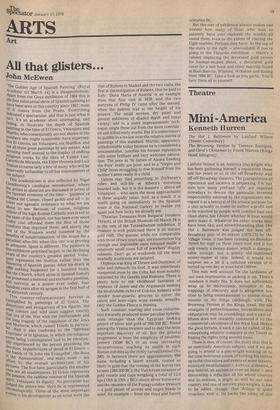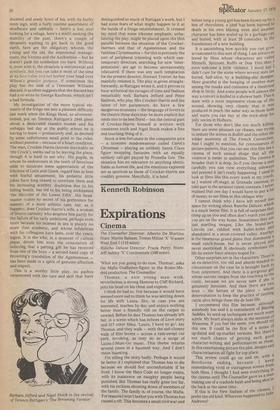Theatre
Mini-America
Kenneth Hurren
The Hot L Baltimore by Lanford Wilson (Tower, Canonbury) The Browning Version by Terence Rattigan, and Carol's Christmas by Frank Marcus (Kings Head, Islington) Lanford Wilson is an America playwright who has been gathering himself a reputation these last ten years or so in the off-Broadway and off-off-Broadway theatres. The juxtaposition of reputation and location is perplexing. I'm not sure how many prefixed 'offs' are required nowadays to denote the particular inverted respectability admired by the cognoscenti who regard it as a betrayal of the artistic purpose for a play actually to make its author a profit and to be watched by people with combed hair and 'clean shirts, but I doubt whether Wilson would quite make it. Whatever his other works may have been like, and notwithstanding that The Hot L Baltimore was judged the best offBroadway play of its season (1972-73) by the Village Voice, it has been running on .Bleecker Street for nigh on three years now and is not only clearly a money-maker, which is disreputable enough, but a pretty old-fashioned money-maker at that. Indeed, it would not surprise me a bit if a celluloid version of it turned up one day at your local Odeon.
This may well account for the tardiness of our own impresarios in picking it up. There's nowhere it really fits. It does not sufficiently wrap up its microcosmic metaphor in the trappings of obscurity and is altogether too close to being entertainment to arouse much interest on the fringe (although, with The Browning Version at the Kings Head, the old amalgam of pretentiousness, slovenliness and obfuscation may be crumbling), and a cast of fifteen does not instantly commend it to the commercial calculators of the West End. Hence the good fortune, if such it can be called, of the enterprising amateur company at the Tower in finding the rights lying around loose.
There is also, of course, the point that this is an essentially American subject, and if we are going to attend to a playwright hooking on to the time-honoured notion of holding his mirror up to the characters and events of some bizarre, miniature establishment — a circus, a theatre, a pop festival, an asylum or even an hotel — and discovering a reflection of his whole country and its malaise, it might as well be our own country and one of our own playwrights. It has to be added, though, that Wilson is quite vivacious with it. He packs the lobby of this doomed and seedy hotel of his, with its faulty neon sign, with a fairly routine assortment of deadbeats and oddballs — here's a lost soul looking for a refuge, here's a misfit seeking the stability of the past, there's a couple of dreamers wanting to get back to the good earth, here are the obligatory whores, the young and the old, the impersonal management, the Victims and the Authorities — but he doesn't push his symbolism too hard. Without it, even with it, the situation is sentimental and synthetic, but you can take it most of the time at its face value and not bother your head over Wilson's grander purpose. If sometimes the play has the look of a Tennessee Williams discard, it as often suggests that the discard has had a re-write by George Kaufman, which isn't a bad formula.
My investigation of the more typical elements of the fringe ran into a pleasant difficulty last week when the Kings Head, as aforementioned, put on Terence Rattigan's 1948 piece about a desiccated classics master and his unhappy last day at the public school he is having to leave — prematurely and, as decreed by some unfortunate small print in the rules, without pension — because of a heart condition. The man, Crocker-Harris (known inevitably as `the Crock'), seems sad to be leaving the place, though it is hard to see why. His pupils, in whom he endeavours in the teeth of ferocious odds to inculcate some appreciation of the felicities of Latin and Greek, regard him at best with fearful amusement;. his pedantic little jokes have long ceased to entertain them and his increasing acerbity, doubtless due to his failing health, has led to his being nicknamed the Himmler of the Lower Fifth'. His headmaster makes no secret of his preference for masters of a more athletic cast; nor, as it happens, does Crocker-Harris's wife, a woman of brazen carnality who despises him partly for the failure of his early ambitions, perhaps even more because his interest in sex is plainly no more than academic, and whose infidelities with his colleagues have been, over the years, legion. It is she who, in a moment of callous pique, denies him even the consolation of believing that a parting gift he has received from one of the boys — a second-hand copy of Browning's translation of the Agamemnon — has been made in a spirit of genuine affection and respect.
This is a worthy little play, its pathos carpentered with the care and skill that have distinguished so much of Rattigan's work, but I had some fears of what might happen to it at the hands of a fringe establishment. It crossed my mind that some irksome emphasis, unbalancing the play, might be placed upon the thin parallel between the situation of the CrockerHarrises and that of Agamemnon and the faithless Clytemnestra — for this is precisely the sort of peripheral trimming with which contemporary directors, searching for new 'interpretations', are apt to become unreasonably infatuated. If there was any such temptation for the present director, Stewart Trotter, he has manfully resisted it. The play is given straightforwardly, as Rattigan wrote it, and it proves to have withstood the ravages of time and fashion remarkably well. Barbara Jefford and Peter Baldwin, who play Mrs Crocker-Harris and the latest of her paramours, do have a few dangerous moments the language of lovers in the theatre these days may be more explicit but tends also to be less florid — but the central part of Crocker-Harris himself is written with consistent truth and Nigel Stock makes a fine and touching thing of it.
Stock is less fortunate in the companion pice — a tiresome misdemeanour called Carol's Christmas — playing an unlikely Santa Claus figure swapping fantasies with an equally unlikely call-girl played by Prunella Gee. The situation has no relevance to anything identifiable as human life, and the emotions explored are as spurious as those of Crocker-Harris are credibly genuine. Mercifully, it is brief.



























 Previous page
Previous page